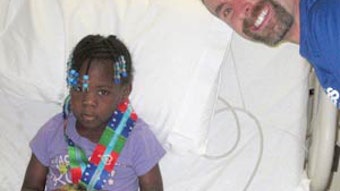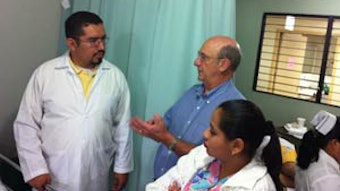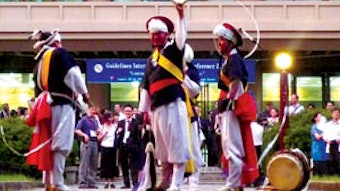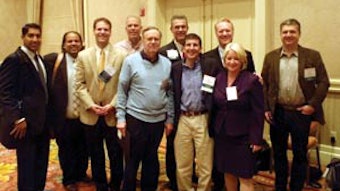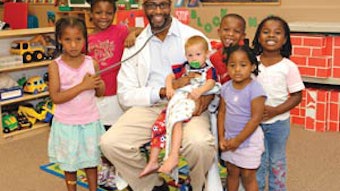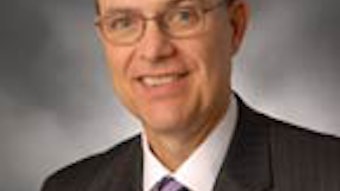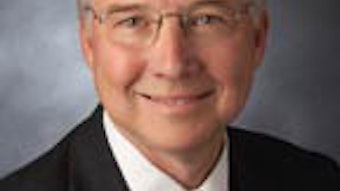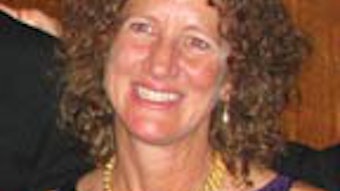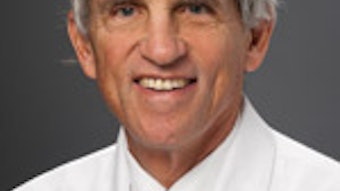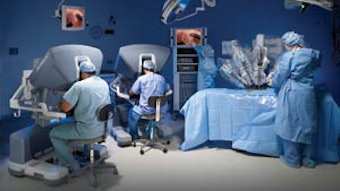Delivering the Best Care to Difficult Patients
Joseph E. Hart, MD, MS, Chair, Board of Governors Rules & Regulations Committee Waterloo, Iowa One of my favorite courses at the 2011 AAO-HNSF Annual Meeting & OTO EXPO was “The Difficult Patient,” which presented a project out of Henry Ford Health System, Detroit, MI. A young head and neck surgeon on staff, named Tamer Abdul-Hamlin Ghanem, MD, PhD, had some challenging patients in clinic. One young patient had kept his heavy drinking a secret from his immediate family, and denied the problem with the otolaryngology clinic staff. He had successful cancer surgery, yet had complications and an extended hospital stay due to delirium tremens treatment. Instead of having the departmental chair, Kathleen Yaremchuk, MD, and administrators chastise the patient, the care team approached the significant problem of identifying risk factors as an opportunity. They suggested a support staff position to share some of the immense burden of gleaning the real picture in their patients. Their attitude toward the problem was part of the solution. The otolaryngology team created a staff position for a psychologist, Michael Ryan, PhD, to meet with the patient and family to help determine the best plan of care. The psychologist routinely meets with the head and neck surgeon to discuss the possible treatment options, and then meets with the patient and family to evaluate their ability to partner with the plan of action. Being able to identify areas of support can be challenging for all of us, no matter how well connected we are. Surgeons know that patients and families may have issues that are not talked about or dealt with effectively. The sequelae can be far-reaching, if the issues are not identified and dealt with properly from the outset. Clinical impact can be a significant drain on patients, family members, physicians, staff, the hospital system, and community. Clarity and honesty can be lacking because patients may live in some degree of denial of their psychosocial challenges. Their day-to-day living situations may allow malcoping based on denial of the problem. This is where we surgeons can ask for, and get, some much needed help. As needed, the psychologist on staff at Henry Ford Hospital enters to perform straightforward evaluations of cognitive, emotional, and supportive environments. Several provided examples are eye-opening and relevant. One patient was estranged from his family and had to re-establish some support before surgery could be scheduled. Anger issues were identified and limits were set. All this is much easier to work out ahead of time, rather than after surgery. Another example was a patient who, due to some neurologic problems, was actually much lower functioning than his wife would allow anyone to see. The identification of that problem helped establish what the patient could tolerate for treatment. Without the psychologist’s evaluation, he may have been offered something more complex than he could emotionally and physically tolerate. A third example was a patient, spouse, and friend (advocate) who showed mistrust in all interactions with the physicians, nurses, and staff. The healthcare team dealt with it in an open way that did not deny the challenge but moved forward, with the patient always at the forefront. Identifying these concerns can help ease the burden on the surgeon and the whole team. At Henry Ford, it helped identify the problems at hand. It did not make things perfect, but did demonstrate where effective help could be offered to that patient, at that particular time. It raised the situation to something more clearly recognized as uplifting to all. What is further amazing to me was that this was taken on by a hospital system in a community that is suffering economically in ways I can only imagine. I had gotten to know some of the otolaryngology staff at Henry Ford through leadership in AAO-HNS. I had the privilege of going to their presentation, and I had the opportunity to meet them later. They were quite humble in their approach in dealing with the problems in their clinic. I felt their approach would help me in my practice. Likewise, I see many other otolaryngologists making headway on so many fronts. I wanted to point these people out. I welcome my colleagues to point out other positive stories, or their successes, to our Academy.
Joseph E. Hart, MD, MS, Chair, Board of Governors Rules & Regulations Committee Waterloo, Iowa
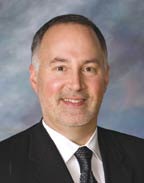 Joseph E. Hart, MD
Joseph E. Hart, MDOne of my favorite courses at the 2011 AAO-HNSF Annual Meeting & OTO EXPO was “The Difficult Patient,” which presented a project out of Henry Ford Health System, Detroit, MI. A young head and neck surgeon on staff, named Tamer Abdul-Hamlin Ghanem, MD, PhD, had some challenging patients in clinic. One young patient had kept his heavy drinking a secret from his immediate family, and denied the problem with the otolaryngology clinic staff. He had successful cancer surgery, yet had complications and an extended hospital stay due to delirium tremens treatment. Instead of having the departmental chair, Kathleen Yaremchuk, MD, and administrators chastise the patient, the care team approached the significant problem of identifying risk factors as an opportunity. They suggested a support staff position to share some of the immense burden of gleaning the real picture in their patients. Their attitude toward the problem was part of the solution.
The otolaryngology team created a staff position for a psychologist, Michael Ryan, PhD, to meet with the patient and family to help determine the best plan of care. The psychologist routinely meets with the head and neck surgeon to discuss the possible treatment options, and then meets with the patient and family to evaluate their ability to partner with the plan of action.
Being able to identify areas of support can be challenging for all of us, no matter how well connected we are. Surgeons know that patients and families may have issues that are not talked about or dealt with effectively. The sequelae can be far-reaching, if the issues are not identified and dealt with properly from the outset. Clinical impact can be a significant drain on patients, family members, physicians, staff, the hospital system, and community.
Clarity and honesty can be lacking because patients may live in some degree of denial of their psychosocial challenges. Their day-to-day living situations may allow malcoping based on denial of the problem. This is where we surgeons can ask for, and get, some much needed help. As needed, the psychologist on staff at Henry Ford Hospital enters to perform straightforward evaluations of cognitive, emotional, and supportive environments.
Several provided examples are eye-opening and relevant.
One patient was estranged from his family and had to re-establish some support before surgery could be scheduled. Anger issues were identified and limits were set. All this is much easier to work out ahead of time, rather than after surgery.
Another example was a patient who, due to some neurologic problems, was actually much lower functioning than his wife would allow anyone to see. The identification of that problem helped establish what the patient could tolerate for treatment. Without the psychologist’s evaluation, he may have been offered something more complex than he could emotionally and physically tolerate.
A third example was a patient, spouse, and friend (advocate) who showed mistrust in all interactions with the physicians, nurses, and staff. The healthcare team dealt with it in an open way that did not deny the challenge but moved forward, with the patient always at the forefront.
Identifying these concerns can help ease the burden on the surgeon and the whole team. At Henry Ford, it helped identify the problems at hand. It did not make things perfect, but did demonstrate where effective help could be offered to that patient, at that particular time.
It raised the situation to something more clearly recognized as uplifting to all.
What is further amazing to me was that this was taken on by a hospital system in a community that is suffering economically in ways I can only imagine.
I had gotten to know some of the otolaryngology staff at Henry Ford through leadership in AAO-HNS. I had the privilege of going to their presentation, and I had the opportunity to meet them later. They were quite humble in their approach in dealing with the problems in their clinic. I felt their approach would help me in my practice. Likewise, I see many other otolaryngologists making headway on so many fronts. I wanted to point these people out.
I welcome my colleagues to point out other positive stories, or their successes, to our Academy.
